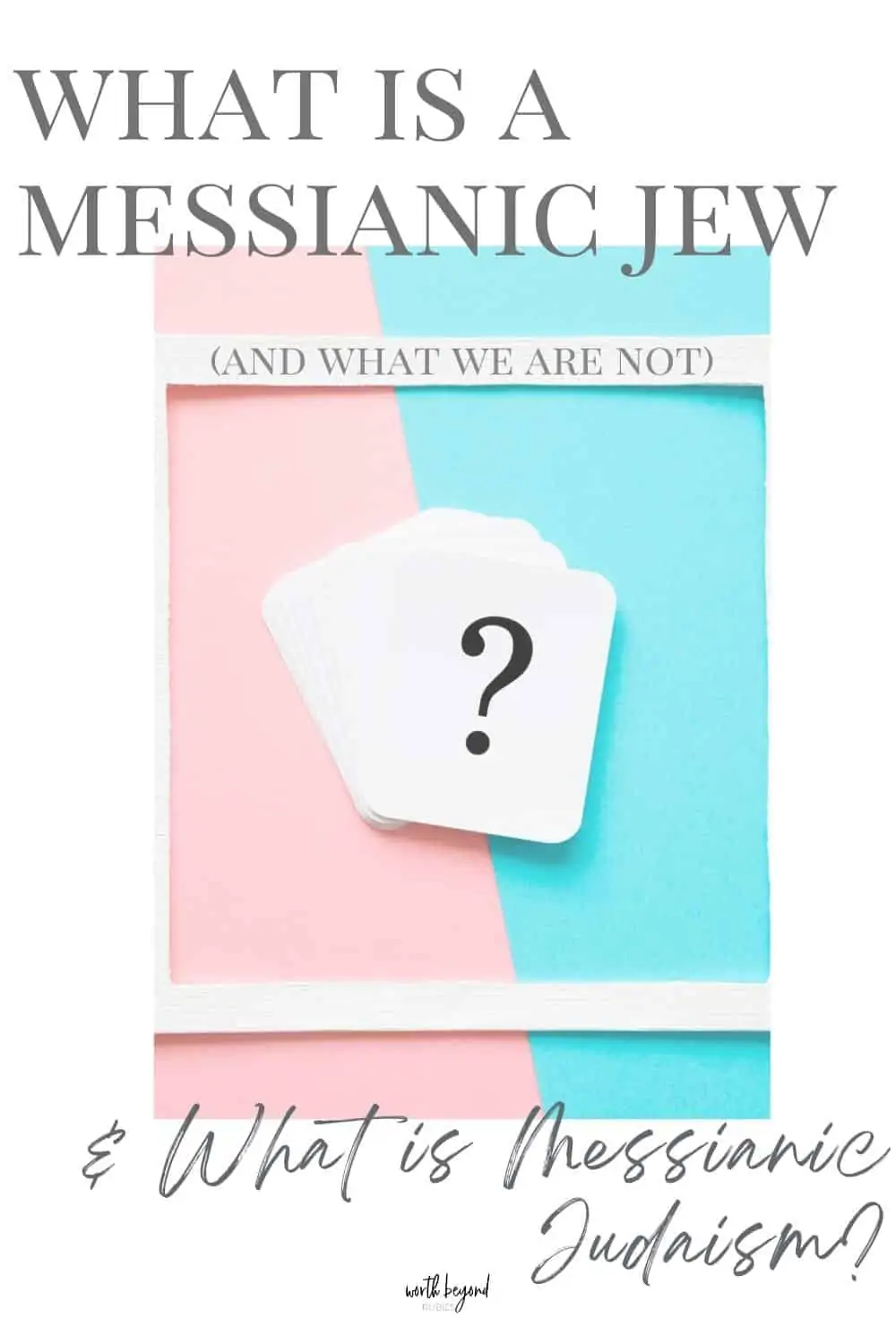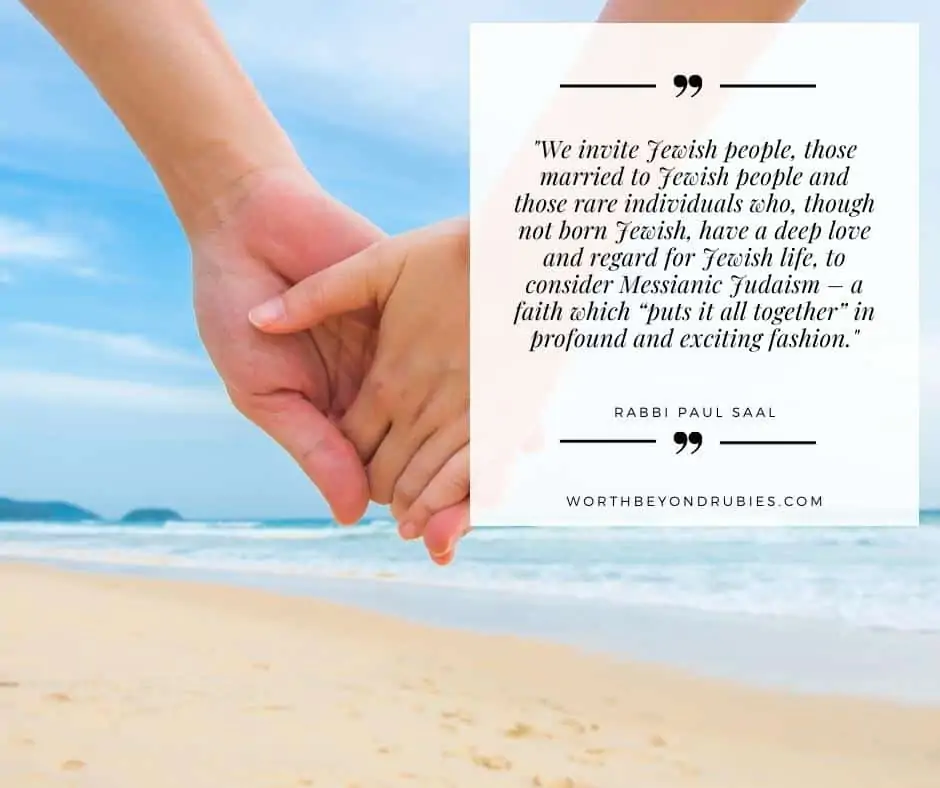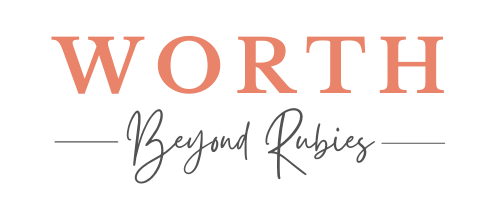What is a Messianic Jew and What is Messianic Judaism?
Please note that this article may contain affiliate links. As an Amazon Associate, I earn on qualifying purchases at no additional cost to you. You can read more at the bottom of this page or read my full disclosure on my Affiliate Disclosure Page
You may have heard the term Messianic Jew, even here on my site, and wondered “What is a Messianic Jew exactly?”. It’s a fair question that comes with other questions as well. What do Messianic Jews believe? Are Messianic Jews just legalistic Christians who keep Torah?
Well, read on and learn what a Messianic Jew is exactly and what we are not!
In order to identify what a Messianic Jew is, I first have to identify Messianic Judaism.
What is a Messianic Jew?
The simple answer is that a Messianic Jew is an individual of Jewish heritage who chooses to live out their Jewish identity while observing and following the teachings of Jesus (Yeshua).
Doesn’t That Make Them Christians Then?
No, it does not. It makes them Messianic Jews.
You see, rather than adopting Christianity and abandoning their Jewish identity, Messianic Jews see their faith as a Judaism, with Yeshua as Messiah.
There ARE Jewish Christians, and we will cover that in a moment. But I wanted to give a brief definition before going more in-depth.
So let’s continue…
What is Messianic Judaism in the Modern Era?
David Rudolph states about the modern Messianic Jewish movement:
“In the late 1960’s and early 1970’s, a large number of Jews in their twenties became believers in Yeshua and refused to assimilate into Gentile churches. They wanted to maintain their Jewish identity and live as Jews.”
David Rudolph – Introduction to Messianic Judaism p.30
While they were not by any stretch of the imagination the first Jewish followers of Jesus (those were literally Yeshua’s own disciples in the Word of God), they were the modern movement of Jewish people coming out of the churches and deciding to live and worship like the wider Jewish world, in Jewish forms of worship.
They didn’t hate church. They didn’t dislike gentile believers. They just wanted to live their Jewish identity and Jewish culture.

Rabbi Paul Saal of Congregation Shuvah Yisrael (my own Rabbi) defines it this way:
Among Jewish people today there are various denominations or forms of Jewish faith. These include Orthodox, Conservative, Reform and others. In recent years another kind of Judaism has emerged. It is called Messianic Judaism.
Rabbi Paul Saal, Shuvah Yisrael – https://www.shuvah.org/what-is-messianic-judaism/
Like the others, it is a way of expressing love for and obedience to the God of Israel. And again, like other forms, Messianic Judaism has its own unique quality. Our very special “place in the sun” centers on our conviction that Jesus, who we call by his Hebrew name, Yeshua, is the long-awaited Messiah and King of the Jewish people.
Like all other forms of Judaism, we seek to live in ways that resonate with our Jewish past and present. But our Messiah takes center-stage as we seek to live as faithful Jews.
The centrality of Messiah Yeshua puts us in profound spiritual unity with people in another worldwide community – the Christian Church.
Though we practice our faith differently, we have deep appreciation for the Church. Our primary sense of identity lies with the Jewish people. But, we share a deep bond with all who see Jesus as the ultimate answer to the great questions of life.
Messianic Judaism is new in one sense, but very old in another. After all Yeshua was Jewish. All his earliest followers were as well. The Renewed Covenant was written entirely by Jewish people and the First Century “Jesus movement” was entirely a Jewish affair.
So, in a sense, Messianic Judaism is the re-emergence of one of the many kinds of Judaism practiced 2,000 years ago!
We invite Jewish people, those married to Jewish people and those rare individuals who, though not born Jewish, have a deep love and regard for Jewish life, to consider Messianic Judaism – a faith which “puts it all together” in profound and exciting fashion.

According to Hashivenu, in which my Rabbi Paul Saal was instrumental, was founded as such:
In 1997 and 1998 five Messianic Jewish leaders met in Albuquerque, Los Angeles, and Las Vegas to determine how they might best assist the Messianic Jewish movement during its next phase of development. Rabbis Robert Chenoweth, Mark Kinzer, Paul Saal, and Michael Schiffman were assembled by founder Rabbi Stuart Dauermann, and together they articulated seven core values describing the Messianic Judaism they envisioned. Those values have guided Hashivenu in the decades since.
Hashivenu – http://hashivenu.org/history/
They defined Messianic Judaism in their core values as follows:
Messianic Judaism is a Judaism and not a cosmetically altered “Jewish style” version of what is extant in the wider Christian community.
Hashivenu – http://hashivenu.org/core-value-1/
They also state:
Hashivenu envisions mature Messianic Judaism to be an authentic expression of Jewish life that maintains substantial continuity with Jewish tradition. But this is a Judaism that is energized by faith in Yeshua of Nazareth, whom we honor as both the promised Messiah and the fullness of Torah.
Hashivenu – http://hashivenu.org/
Mature Messianic Judaism is not simply Judaism plus Yeshua, or Yeshua plus Judaism, but an integrated and seamless whole in which discipleship to Yeshua is expressed in traditional Jewish forms, and in which the contemporary practice of Judaism is renewed in Yeshua and by the power of the Spirit.
A key definition of Messianic Judaism is the one stated by the UMJC or Union of Messianic Jewish Congregations. I have stated this definition in multiple places on this site already so I will only list their Basic Statement. If you want to view their Extended Statement, you can view it on their website.
Basic Statement
UMJC – https://www.umjc.org/defining-messianic-judaism
The Union of Messianic Jewish Congregations (UMJC) envisions Messianic Judaism as a movement of Jewish congregations and groups committed to Yeshua the Messiah that embrace the covenantal responsibility of Jewish life and identity rooted in Torah, expressed in tradition, and renewed and applied in the context of the New Covenant. Messianic Jewish groups may also include those from non-Jewish backgrounds who have a confirmed call to participate fully in the life and destiny of the Jewish people. We are committed to embodying this definition in our constituent congregations and in our shared institutions.
Dr. David Rudolph states in his book, Introduction to Messianic Judaism:
“Consequently today, many people use the term “Messianic Jew” to refer to any Jewish believer in Yeshua, whereas the historic term connotes a Jew who believes in Yeshua and continues to live as a Jew as a matter of covenant, calling or national duty before God.”
David Rudolph – Rudolph & Willitts Introduction to Messianic Judaism p. 33
My friend and teacher, Rav Carl Kinbar, says:
“All forms of Messianic Judaism have at least these three characteristics in common: they all embrace the unique status of the person, words and work of Yeshua the Messiah; they view the Scriptures as normative; and they observe some level of traditional Jewish practice.”
Carl Kinbar – Rudolph & Willets Introduction to Messianic Judaism p. 72
What is a Messianic Jew?
So, given these definitions, although brief, of Messianic Judaism, we can then hone in on the question “What is a Messianic Jew?”
A Messianic Jew is a Jewish person who is Jewish first and foremost. So that is defined as someone born Jewish or who had converted at some point in their life.
They may have been born to Messianic believers themselves and grown up in Messianic synagogues with Jewish customs or they may have grown up in traditionally Jewish synagogues or in non-observant Jewish homes and then were introduced to Yeshua as Messiah of Israel at some point in their life.
However, the key to what makes one a Messianic Jew is that, as you see in the definitions offered above, they continue to live in their Jewish identity.
They keep a Jewish home. They take part in a Jewish community. Some even attend non-Messianic Jewish synagogues openly if there are no Messianic synagogues near them and, for the most part, are welcome and are a part of that congregational family!
There ARE Jewish Christians, for lack of a better term. These are Jews who choose to follow Yeshua within a church environment.
Perhaps they never knew a Jewish upbringing or their Jewish heritage and grew up within Christian churches and feel more comfortable there.
Perhaps they are married to Gentile Christians and choose to raise their children in the church rather than in the Messianic Jewish community as observant Jews. We are all part of the body of the Messiah and each person has to choose their own way of following Him.
Messianic Jews (and even many Jewish Christians) do not see belief in Yeshua as the Jewish Messiah as converting to Christianity, period…end of the story.
Christianity as we know it was not a “thing” in the early days of what we call the church. There were either Jewish followers of Yeshua or gentile followers of Yeshua and they prayed and worshipped together until about the middle of the 2nd century.
So Jesus Christ, Yeshua, a Jew, did not come to form a new “religion”. He came to bring the Jews AND all the nations to the God of Israel as one ekklesia or “assembly” of His followers.
To see a wonderful presentation on this, you can see Dr. Jen Rosner, my amazing professor from my Introduction to Messianic Judaism course and a highly respected scholar, giving a talk here on Messianic Judaism in Jewish-Christian Relations.
Jesus Christ, Yeshua, a Jew, did not come to form a new "religion". He came to bring the Jews AND all the nations to the God of Israel as one ekklesia or "assembly" of His followers. Click To TweetSo a Messianic Jew is a Jew! Makes sense right?
Our Jewish identity matters. Our Jewish identity is who we are.
Dr. Jen Rosner writes in her article “Messianic Jewish Life Together: Covenant, Commission, and Cultural Brokerage”:
Jonathan Sacks offers a moving metaphor for the reality of Jewish identity and its distinction from modern Western conceptions of identity. Sacks illustrates modern notions of identity construction by asking us to imagine ourselves standing in a vast and expansive library with endless rows of bookshelves lined with books on every conceivable topic. We are given the freedom to pull any book we choose off the shelf, to browse endlessly and read widely. Each page of each book we read adds something to our understanding of the world around us and therefore ourselves, but we are free to reshelf the book at any point; it makes no claim upon us.
Jennifer Rosner – “Messianic Jewish Life Together: Covenant, Commission, and Cultural Brokerage” – Kesher Journal, August 12, 2021
Alternatively, Sacks paints a scenario in which one book in particular catches our attention, for the name of our family is written on the spine. We open the book only to discover that it tells the story of our ancestors, one generation at a time, and that the book was expressly written for the sake of subsequent generations. When we come to the end of the book, we find a blank page with our name written at the top. This is the book that writes our identity as Jews and whose story we continue to tell with our lives, which constitute the next chapter in this unfolding family history. According to Sacks, each of us comprises a letter in the living scroll that embodies the ongoing corporate reality of the Jewish people.
Sacks’s description is fitting because it reminds us that this identity—Jewish identity—demands something of us in return; in fact, it demands everything of us. It is not something we maintain by passively receiving it. Rather, it is only preserved by actively forging the next chapter in loyalty and faithfulness to the inherited narrative contours. And the story itself is no arbitrary story—it is the story of a people whose existence and obedience uniquely reveal God in the world, whose commission is to create a society in which God is rightfully exalted as King, and each individual is given the honor and dignity due to those bearing God’s image.
We are Jews who believe in Yeshua (Jesus) as the Messiah and still maintain our Jewish identity and our Jewish traditions.
We are forging our next chapter, revealing God in the world.
We attend synagogue, we celebrate the festivals, and we keep the Sabbath.
But we do NOT seek to tell non-Jewish believers in Jesus that they must do the same.
If a non-Jewish believer has a calling to keep the Sabbath, then that is their calling. But Messianic Jews do not seek to tell non-Jewish believers that they must do these things.
Again, if you feel that you ARE called to this and have a real leading by the Holy Spirit, I suggest you read my post on What is a Messianic Gentile.
If you want to learn more about what Messianic Judaism is and what is a Messianic Jew, this video from Two Messianic Jews will give you all the info you need!!
Rudolph, David and Joel Willitts. Introduction to Messianic Judaism – Its Ecclesial Context and Biblical Foundations. Grand Rapids: Zondervan, 2013.

Thank you so much Diane for that enlightening post on Messianic Jew /Judaism. There is real clarity on these terms now. Your efforts are appreciated 👍🙏
I am so glad you enjoyed it Saji and that it clarified the terms for you!! Thank you for your comments!